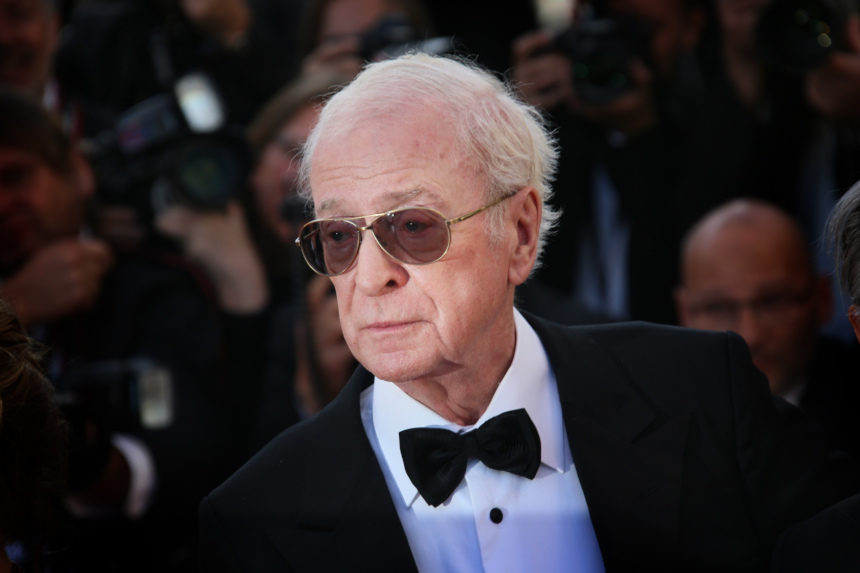For The Saturday Evening Post, I’ve talked to the biggest and the best — the world’s most interesting, influential, and talented famous faces. I’m always asked about favorites. Right at the top of that list is Michael Caine. The best storyteller: He can mesmerize a table of A-listers like nobody else. A spectacular actor: Caine brings charisma and truth to a character with a mastery that only a few screen stars possess. Fans across generations adore him, yet this legend has a relationship with fame that is straightforward and down to earth. In his books and in person, he shares a sly wisdom that always leaves me laughing and thinking.
At 87, he’s still ready to step in front of the camera to play parts he can’t resist. You’ll see him in the upcoming Tenet, an action epic with a twist of time traveling from Christopher Nolan, who considers Michael a good luck charm as well as acting genius, and Best Sellers, a bittersweet comedy about an cranky, aging author. I’ve often asked Michael, with all that’s come his way, how much does he credit hard work and how much does he bow to good fortune? He says, “I gave God a hand.”
Jeanne Wolf: You seem to slip so effortlessly into every character you play but I know how very serious you are about your work. Does the intense dedication pay off as you hide the effort?
Michael Caine: If you’re watching me in a movie and you say to your companion, “Isn’t Michael Caine a wonderful actor,” then I’ve failed. You shouldn’t be noticing the acting. You should be wondering what’s gonna happen to the guy I’m playing. The art is to make yourself disappear.
There are actors who hold up a mirror and say, “Look at me.” I hold up a mirror and say, “Look at you!” My acting should be so human that you say, ”How did he know that about me?” What you should get from my performance, to quote Edmond Wilson, is a “shock of recognition.” I want people to see me on the screen me and say, “I am him.” They know if they met me in the street, I’d talk to them. I wouldn’t be in a limousine flashing by with two blondes and a bottle of champagne. Although, mind you, that’s not a bad idea.
When actors are nervous, it can screw up a scene because it will make the audience feel uncomfortable. I’m often kidding and joking right up to the minute when they call “action.” With me you feel comfortable because I make it look like it’s a walk in the park. But that can be a double-edged sword. It’s like watching Fred Astaire dance. People may think, It’s a breeze. I could do that. Believe me, it isn’t as easy as it looks. It’s like a sort of drug in a way. It’s getting it absolutely right and knowing you’ve done it and you couldn’t do it any better. Sometimes I say to the director, “If you want it any better, you’re gonna have to get someone else cause I can’t do it better than this.” And if you get to that stage, you know, it’s great.
JW: You’ve written a book about acting, yet you’ve said that watching films and doing films was your own best teacher. So what do you tell your young co-stars about what you’ve learned?
MC: I always used to ask old successful actors for advice. Every single one of them said, “Give up acting.” So I say to young actors, “Don’t ask me for advice. The worst thing is it’s free. If you had to pay for it, it might be worth something.”
Early on I took everything because I had no money and I came from a very poor family. Once I started making movies, I thought no one was going to offer me another one so I always took the next one. Finally, I realized I could stop that. From then on, the mistakes I made in choosing roles were genuine mistakes. I thought it would be a good movie and it wasn’t. That was that. But then you get to another period where you don’t have to work. I only do things that I absolutely cannot refuse. I could not refuse Phillip Noyce offering me The Quiet American. I couldn’t refuse being Austin Powers’s father, or Sandy Bullock’s beauty mentor, and, of course, the butler in Batman. One thing now is I don’t get the girl, I get the part. When I used to get the girl, she’d be the most beautiful. Now I get the most beautiful part.
JW: You have a wonderful marriage. You and Shakira Baksh have great joy together. Has experience taught you how to savor your rich personal life?
MC: I live life to the fullest every day. I believe in that. That’s my basic philosophy. Because this is not a rehearsal. This is the show. We’re not opening next Thursday; this is it, we open today. However old you are I think you have to make the most of your life. And I do. There isn’t a day passed where I don’t try to do something. They nearly retired me once, but I came back.
I have this photograph on my sideboard in my dining room. There are three achievements. There’s one of my holding an Oscar. There’s one of the Queen knighting me with the sword actually touching my shoulder. The other is me standing at the top of Sydney Bridge in Australia after an arduous climb.
I wasn’t a success until very late in life. I never made my first big proper movie until I was 29. I was already set in a very concrete way into the person I was going to be, so nothing ever fazed me. Maybe it started with my mother. My father, who was my role model, went away to the war in 1939. I was six. My mother didn’t say, “Oh, now I have to look after you on my own.” She said, “Now Michael, you have to look after me.” So she made a small man of me. I became my father, which stayed with me for the rest of my life. Looking back, I always figure that I’ve been very, very lucky, and I’m just in awe of how lucky I have been — not what I’ve done. That’s why I don’t gamble. I haven’t got any luck left.
This is the full version of an interview that ran in the July/August 2020 issue of The Saturday Evening Post. Subscribe to the magazine for more art, inspiring stories, fiction, humor, and features from our archives.
Featured image: Denis Makarenko / Shutterstock.com
Become a Saturday Evening Post member and enjoy unlimited access. Subscribe now



